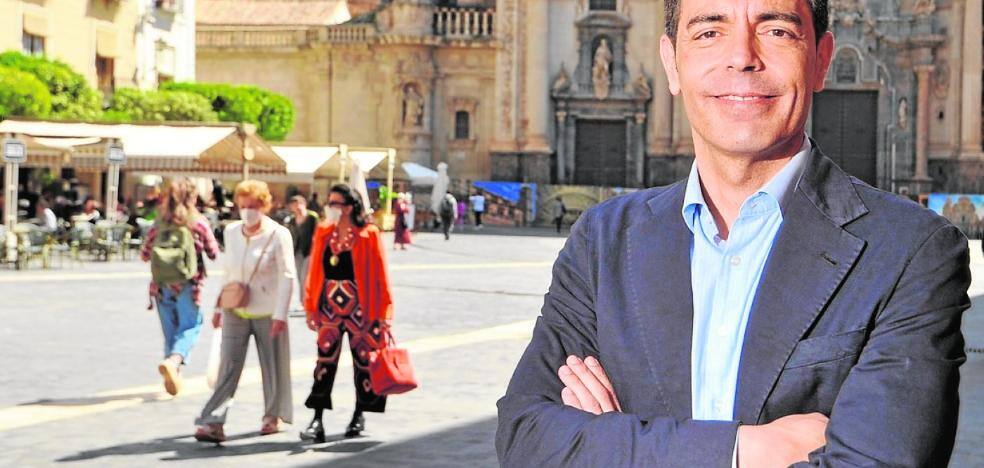The MEP Marcos Ros Sempere, in the Plaza de la Catedral in Murcia. /
Marcos Ros, member of the European Parliament for the PSOE
MEP Marcos Ros Sempere participates in the commemoration of Europe Day that has been scheduled in the central Plaza de Europa in Murcia
Marcos Ros Sempere, MEP member of the Group of the Progressive Alliance of Socialists and Democrats to which the Spanish Socialist Workers’ Party (PSOE) belongs, participates today in the commemoration of Europe Day that has been scheduled in the central Plaza de Europa in Murcia, in a meeting that will discuss the importance of defending pro-European values at a time like the present and the work carried out from Brussels to ensure a suitable present and future for the member countries.
“The pride of feeling European has been encouraged in the last two years with the joint response to the pandemic”
-How is Europe Day presented in the current context?
-It is essential to claim the values of the democratic society of the European Union and how it was born in its day to avoid the constant wars that were in the territory and the devastation they caused. Six countries put the seed not to fight each other and that union has resulted in 70 years of stability and peace.
Unfortunately, we have had two wars at the gates of the European Union, such as the one in the Balkans and the war that Putin has now started, which is why it is so important to claim the strength of democracy, values, equality, peace and the solidarity that the European Union defends.
Its greatness is seen these days with the immediate reception of four and a half million Ukrainian refugees or the activation of the international protection directive, which allows them to be considered residents of the European Union from the moment they set foot on our territory. To this must be added the effort to send humanitarian and military aid to Ukraine or the sanctions packages to Russia.
-How do you define the EU’s response to a global event as adverse as Covid-19?
-The European Union has given an exemplary, rapid, strong and very solid response. We came from previous years, such as the 2008 crisis, where the European Union’s response was late and scarce, since the stability mechanisms arrived very late and that generated distrust in the citizens. However, in dealing with the pandemic, the European Union has shown that it has learned from its mistakes. The response was rapid, with a unique health coordination that has made it possible to act jointly, without leaving any country behind, no matter how small.
The investment in research and vaccines has been spectacular and the speed with which the doses reached all the countries was exemplary. The investment in the purchase of vaccines and that these be taken as a public good and administered to citizens free of charge and following medical and population criteria has been a resounding success. This effort has allowed us to opt for a European Health Union.
At an economic level, the response has also been resounding, with the recovery plans and the more than 750,000 million euros for the next six years that will allow the economy to be stimulated while promoting a transformation of the social, economic, productive and environmental fabric of the Union.
-The war has accentuated the energy crisis. What measures have been taken and what is the roadmap?
-Undoubtedly, the sanctions against Russia vetoing coal, oil and advancing in gas have their consequences. Being supportive will lead us to assume efforts, of course.
The impeccable negotiation of Spain and Portugal to convince Europe that our tariff system cannot depend on the price of gas will soon be seen in the electricity bill with a significant reduction, as is already being seen in the case of gasoline with the discount applied by the Government. So very soon companies and consumers will notice a relief.
-How will the European Union policies benefit the Region of Murcia?
-In terms of the ecological transition and the European Green Deal, discussions are taking place on the new agriculture of the future or how to prevent pressure from increasing to prevent the contamination of groundwater and seawater by nitrates from agriculture. There has also been a debate on the common agricultural policy funds and for the primary sector.
On the other hand, the recovery plans are going to encourage investments in all the territories of the European Union and in the Region of Murcia they are already being noticed, since there are already tenders that have to do with the recovery plan and the Next Generation funds and that will be a very powerful incentive.
The environmental surveillance and control carried out by the EU in protected areas will help to ensure places such as the Mar Menor. Recently a visit from deputies came to learn about the situation of the Mar Menor, they set foot on the ground and a report will come out with the position of the Chamber. Last week I expressed my concern about the state of the gap due to the inaction of whoever has the powers, which is the regional government. We hope that the announced economic injection from the Ministry of Ecological Transition and the analysis and monitoring of what has happened will be the push that the Mar Menor needs for its recovery.
#greatness #European #Union #support #Ukraine #reception #refugees









